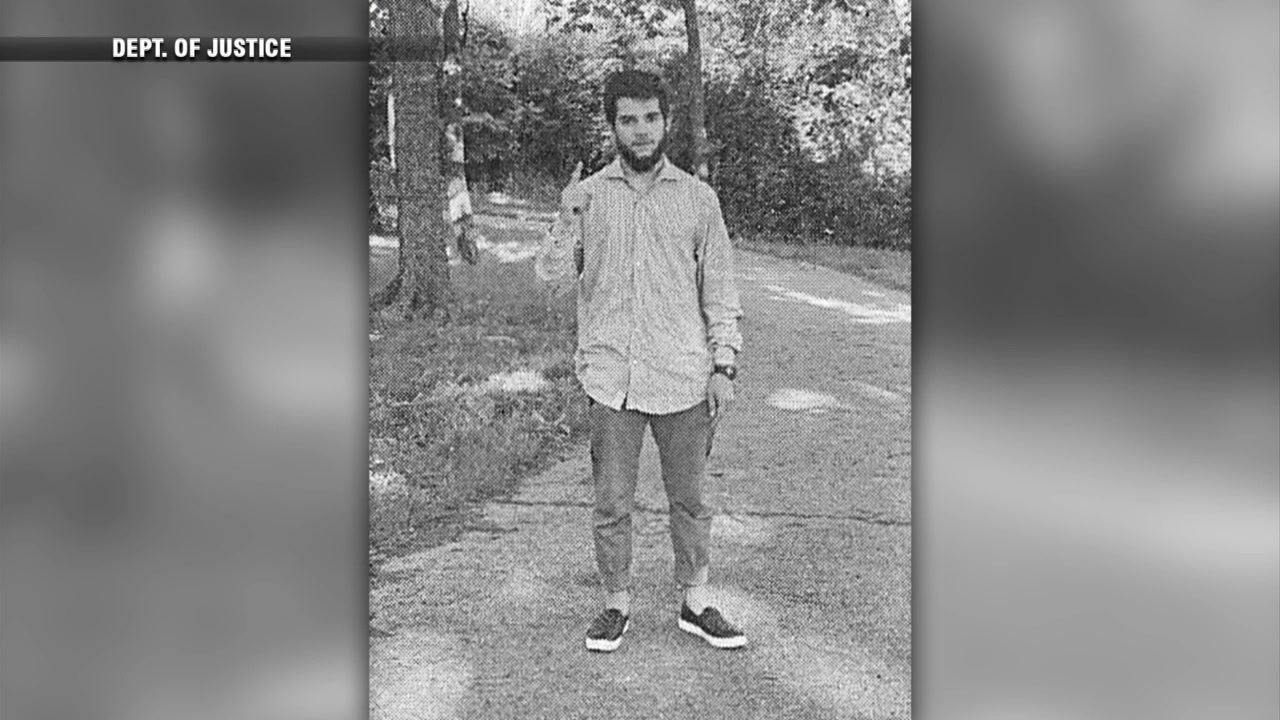
redo Jump to...
print Print...
(KOCO 5 ABC News) – An Afghan citizen living in Oklahoma City was charged Tuesday for conspiring to conduct a terrorist attack on behalf of the Islamic State of Iraq [ISIS].
Nasir Ahmad Tawhedi, 27, allegedly conspired to conduct the attack on Election Day, according to a criminal complaint.
Tawhedi has been living in Oklahoma City with his family after entering the U.S. in 2021 on a special immigrant visa, and was plotting the attack in the name of Islamic State, according to the indictment. The Special Immigrant Visa program, which admitted up to 50 people a year in 2007, then 500 in 2008, is available to people who worked with the U.S. armed forces or under chief of mission authority as a translator or interpreter in Iraq or Afghanistan. [Per VOA: The US granted 26,500 SIVs to Afghans in 2023, which is a record high since the program began in 2008. This is more than double the 11,000 SIVs granted in 2022. Since 2008, nearly 120,000 SIVs have been awarded to Afghans.]
The indictment did not indicate whether Tawhedi worked as translator or interpreter in Afghanistan. The Department of Justice did not immediately respond to a request for comment.
As part of the Tawhedi’s plan, he allegedly took steps to liquidate his family’s assets, resettle members of his family in Afghanistan, obtain weapons and commit a terrorist attack in the U.S.
Tawhedi’s unnamed co-conspirator, who is his wife’s younger brother and a virtual student at South Moore High School near Oklahoma City, advertised the family’s personal property for sale on Facebook. At the FBI’s direction, a confidential source responded to inquire if a computer was still for sale. The FBI source said that he needed the computer for a new gun business he was starting, which ultimately led Tawhedi and the juvenile to meet with the source and other FBI assets at a rural location to test firearms, according to the U.S. Department of Justice.
Tawhedi said that he would be interested in buying assault rifles, magazines and ammunitions from the source.
 On Oct. 7, Tawhedi and his co-conspirator met with FBI assets at a rural location in Oklahoma, where they purchased, received and took possession of two AK-47 assault rifles, 10 magazines and 500 rounds of ammunition. Upon receipt of the weapons, they were arrested.
On Oct. 7, Tawhedi and his co-conspirator met with FBI assets at a rural location in Oklahoma, where they purchased, received and took possession of two AK-47 assault rifles, 10 magazines and 500 rounds of ammunition. Upon receipt of the weapons, they were arrested.
The FBI searched Tawhedi’s phone and obtained communications between the man and a person who facilitated recruitment, training and indoctrination of persons who expressed interest in terrorist activity and who Tawhedi understood to be affiliated with ISIS.
“Brother, our house was sold today. We’ll receive the money by the 15th of October, next month. After that we will begin our duty, Allah willing, with the help of Allah, we will get ready for the election day. Brother, what plan do you have for our family? If not a problem, please introduce us someone who is online, so we could discuss all of the matters with them. May Allah reward you brother,” Tawhedi said in translated messages from September.
Tawhedi is also accused to have accessed, viewed and saved ISIS propaganda on his iCloud and Google accounts, participated in pro-ISIS groups and contributed to a group that funnels money to the terrorist organization.
In communications seized by agents, Tawhedi allegedly indicated that his attack was planned for Election Day, something he confirmed in a post-arrest interview, according to the U.S. Department of Justice. He told officials he was planning to target large gatherings, and he and the juvenile were expected to die as martyrs.
[According to an affidavit viewed by CBS News, federal investigators claims that Tawhedi conducted searches for surveillance cameras in Washington, as well as webcams featuring the White House and the Washington Monument.]Tawhedi was also seen in a video recorded on July 20 reading to two children about the rewards a martyr receives in the afterlife.
He was charged with conspiring and attempting to provide material support to ISIS, which carries a maximum prison sentence of 20 years, and receiving a firearm to be used to commit a felony or a federal crime of terrorism, which carries a maximum prison sentence of 15 years.
The case is being investigated by the FBI Oklahoma City Field Office with assistance of the Oklahoma City and Moore, OK police departments. …
In response to the arrest, U.S. Attorney General Merrick Garland said in a statement, “… We will continue to combat the ongoing threat that ISIS and its supporters pose to America’s national security, and we will identify, investigate, and prosecute the individuals who seek to terrorize the American people. …”
Oklahoma Sen. Markwayne Mullin said he does not know the specifics of how Tawhedi arrived in the U.S. and how he got his special immigrant visa status. He told KOCO 5, however, that when Tawhedi arrived in the fall of 2021 as the U.S. was pulling out of Afghanistan, the U.S. was doing a poor job of vetting Afghan refugees.
“When you go through the clearance, you go through a vulnerability check — like what can be leveraged to make you turn on your host country to do something like attack the elections,” Mullin said. “So, those leverage points are very important for us to understand before we just let them in the country.”
Mullin also said he was told about the investigation weeks ago and praised FBI agents for their work.
Senator Mullin also asked people “not to judge all Afghans that are here because of this one individual…”, saying “there are some great men and women…that are Afghan nationals that have saved many American lives….”
This is a developing story. KOCO 5 will provide additional details as they become available.
Compiled from October 9 reports at KOCO 5 ABC News local.
Questions
1. The first paragraph of a news article should answer the questions who, what, where and when. List the who, what, where and when of this news item. (NOTE: The remainder of a news article provides details on the why and/or how.)
2. On what day were Tawhedi and his high school age brother-in-law planning a terrorist attack?
3. Tawhedi lived with his wife and two kids in Oklahoma City; his wife’s brother (and co-conspirator) lived with his parents and 5 other siblings.
a) When did Tawhedi emigrate to the U.S.?
b) On what type of visa was Tawhedi able to come to the U.S.?
c) How many Afghans have come to the U.S. under this program?
d) How was Tawhedi’s wife’s family (parents and siblings) able to emigrate to the U.S.?
4. List the crimes for which the two Afghan men have been charged. (What are the charges against them?)
5. What evidence is being used in the charges against Tawhedi?
6. a) How much time are they facing, if convicted?
b) Do you think if a ideological Islamist terrorist like this gets released from prison, he won’t attempt to carry out another terrorist attack? Explain your answer.
CHALLENGE: Consider some of the questions we haven’t gotten answers to yet:
- How did Tawhedi get here? – Did he fill out the whole SIV application, or did he just walk across the southern border?
- How was Tawhedi vetted?
- Who wrote him a recommendation letter, who vouched for him? – What job did he do for the U.S. in Afghanistan – was he a translator or interpreter – or something else?
- The visa Tawhedi came under permitted him to bring his wife and kids. Why are his in-laws and their children here?
- Is anyone else in the family going to be charged as accessories to the mass murder plot?
- Where did Tawhedi work in Oklahoma City?
- Why was the co-conspirator brother-in-law attending high school virtually? – Why does South Moore High School offer virtual school?
- How did he and his in-laws afford to buy two houses after only coming 3 years ago?
- How did they afford to own electronics/laptops etc. after having been here a short time.
- How old is Tawhedi’s co-conspirator brother-in-law? Why won’t media outlets provide his name?
- If his family was able to come to the U.S. under his visa and he is convicted of terrorism, do they get to stay in the U.S.? – especially considering he wanted them to go back to Afghanistan to live under “pure Islam”?
Follow this story in the coming week and find the answers to these questions.
Background
The full complaint “United States of America v. Nasir Ahmad Tawhedi” can be read here.
Last week, in a “homeland threat assessment,” the Department of Homeland Security said the U.S. threat environment was expected to remain high in the coming year due to factors including the 2024 election cycle and the war in Gaza. “Lone offenders and small groups continue to pose the greatest threat. Meanwhile, foreign terrorist organizations, including the Islamic State and al Qaeda maintain their enduring intent to conduct or inspire attacks in the [USA],” the department said in an assessment released on Oct. 2.
The Islamic State militant organization (ISIS) killed and executed thousands of people…before it was territorially defeated in Iraq in 2017 and Syria in 2019 under the Trump administration. (from a Reuters report at USAToday on Oct. 9)
Since 2006, Congress has established several Special Immigrant Visa (SIV) programs that allow eligible applicants to resettle to safety in the U.S. SIV recipients qualify for lawful permanent residence in the U.S. and the eventual opportunity to apply to become a U.S. citizen. An applicant who is accepted can bring their spouse and unmarried children (under age 21) to the U.S.
Read a DOJ factsheet “Employment Information Regarding Afghan Special Immigrant Visa Holders and Parolees”
Read: “Special Immigrant Visas for Afghans – Who Were Employed by/on Behalf of the U.S. Government” at the state department website.
Wikipedia notes that to be eligible for the SIV for Afghans, applicants must be Afghan citizens who:
- Provided faithful and valuable service to the US government as documented by a recommendation letter
- Must be experiencing a serious and ongoing threat as a consequence of such employment
Among various documents included in their application, Afghan applicants must include:
- “A recommendation letter from an American citizen who supervised the applicant directly, or if that person cannot be found, a recommendation letter from a non-US citizen countersigned by a US citizen who was overseeing the contract.”
Daily “Answers” emails are provided for Daily News Articles, Tuesday’s World Events and Friday’s News Quiz.



